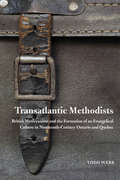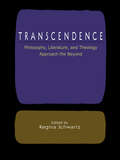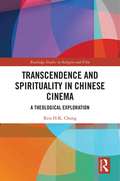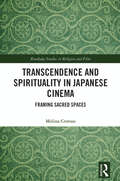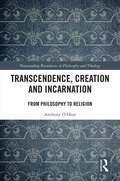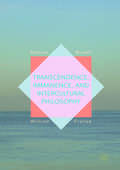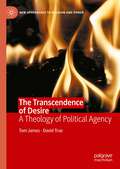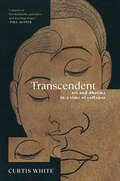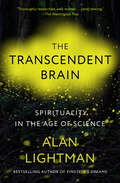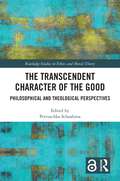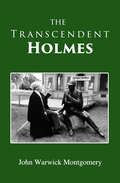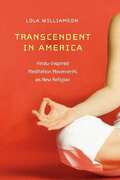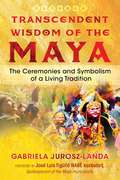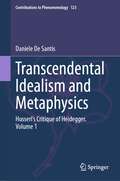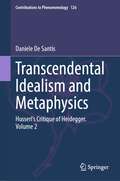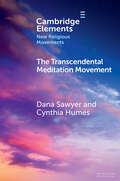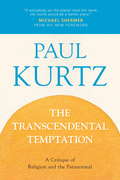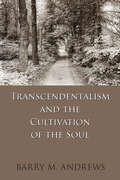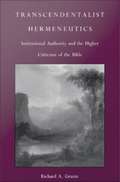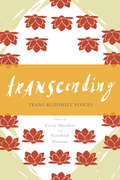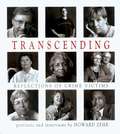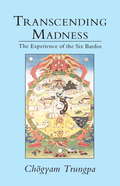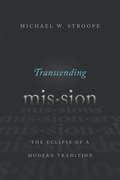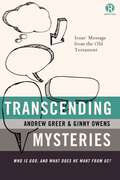- Table View
- List View
Transatlantic Methodists: British Wesleyanism and the Formation of an Evangelical Culture in Nineteenth-Century Ontario and Quebec (McGill-Queen's Studies in the History of Religion #2)
by Todd WebbMethodists in nineteenth-century Ontario and Quebec, like all British subjects, existed as satellites of an influential empire. Transatlantic Methodists uncovers how the Methodist ministry and laity in these colonies, whether they were British, American, or native-born, came to define themselves as transplanted Britons and Wesleyans, in response to their changing, often contentious relationship with the Wesleyan Methodist Church in Britain. Revising the nationalist framework that has dominated much of the scholarship on Methodism in central Canada, Todd Webb argues that a transatlantic perspective is necessary to understand the process of cultural formation among nineteenth-century Methodists. He shows that the Wesleyan Methodists in Britain played a key role in determining the identities of their colonial counterparts through disputes over the meaning of political loyalty, how Methodism should be governed, who should control church finances, and the nature and value of religious revivalism. At the same time, Methodists in Ontario and Quebec threatened to disrupt the Wesleyan Methodist Church in Britain and helped to trigger the largest division in its history. Methodists on both sides of the Atlantic shaped - and were shaped by - the larger British world in which they lived. Drawing on insights from new research in British, Atlantic, and imperial history, Transatlantic Methodists is a comprehensive study of how the nineteenth-century British world operated and of Methodism's place within it.
Transcendence: Philosophy, Literature, and Theology Approach the Beyond
by Regina SchwartzFirst published in 2004. Routledge is an imprint of Taylor & Francis, an informa company.
Transcendence and Spirituality in Chinese Cinema: A Theological Exploration (Routledge Studies in Religion and Film)
by Kris H.K ChongThis book provides a framework by which a global audience might think theologically about contemporary films produced in mainland China by Chinese directors. Up to this point the academic discipline of Christian theology and film has focussed predominantly on Western cinema, and as a result, has missed out the potential insights offered by Chinese spirituality on film. Mainland Chinese films, produced within the nation’s social structure, offer an excellent lingua franca of China. Illuminating the spiritual imagination of Chinese filmmakers and their yearning for transcendence, the book uses Richard A. Blake’s concept of afterimage to analyse the potential theological implications of their films. It then brings Jürgen Moltmann’s "immanent-transcendence" and Robert K. Johnston’s "God’s wider Presence" into conversation with Confucianist and Daoist ideas of there being, spirituality-speaking, "More in Life than Meets the Eye" than simply material existence. This all combines to move beyond film and allow for a Western audience to gain a new perspective on Chinese culture and traditions. One that uses familiar Western terms, while avoiding the imposition of a Western mindset. This is a new perspective on cinema, religion and Chinese culture that will be of keen interest to scholars of Religion and Film, Religious Studies, Theology, Sociology of Religion and Chinese Studies.
Transcendence and Spirituality in Japanese Cinema: Framing Sacred Spaces (Routledge Studies in Religion and Film)
by Melissa M. CroteauThis book explores significant representations of Shinto and Buddhist sacred space, spiritual symbols, and religious concepts that are embedded in the secular framework of Japanese films aimed at general audiences in Japan and globally. These cinematic masterpieces by directors Akira Kurosawa, Hayao Miyazaki, Hirokazu Kore-eda, and Makoto Shinkai operate as expressions of and, potentially, catalysts for transcendence of various kinds, particularly during the Heisei era (1989-2019), when Japan experienced severe economic hardship and devastating natural disasters. The book’s approach to aesthetics and religion employs the multifaceted concepts of ma (structuring intervals; liminal space-time), kū (emptiness; sky), mono no aware (compassionate sensibility; resigned sadness), and musubi (generative interconnection), examining the dynamic, evolving nature of these ancient principles that are at once spiritual, aesthetic, and philosophical. Scholars and enthusiasts of Japanese cinema (live action and anime), religion and film, cinematic aesthetics, and of the relationship between East Asian religions and the arts will find fresh perspectives on these in this book, which moves beyond conventional notions of transcendental style and essentialized approaches to the multivalent richness of Japanese aesthetics.
Transcendence, Creation and Incarnation: From Philosophy to Religion (Transcending Boundaries in Philosophy and Theology)
by Anthony O'HearThis book expounds and analyses notions of transcendence, creation and incarnation reflectively and personally, combining both philosophical and religious insights. Preferring tender-minded approaches to reductively materialistic ones, it shows some ways in which reductive approaches to human affairs can distort the appreication of our lives and activities. In the book’s first half it examines a number of aspects of human life and experience in the thought of Darwin, Ruskin, and Scruton with a view to exploring the extent to which there could be intimations of transcendence. The second half is then devoted to outlining an account of divine creation and incarnation, deriving initially, though not uncritically, from the thought of Simone Weil. The text concludes by examining the extent to which grace is needed to engage in religious practice and belief. Taking in art, literature, music and classical Greek writings, this is a multifaceted thesis on transcendence. It will, therefore, will be of keen interest to any scholar of Philosophy of Religion, Theology, Aesthetics and Metaphysics.
Transcendence, Immanence, and Intercultural Philosophy
by Nahum Brown William FrankeThis book presents detailed discussions from leading intercultural philosophers, arguing for and against the priority of immanence in Chinese thought and the validity of Western interpretations that attempt to import conceptions of transcendence. The authors pay close attention to contemporary debates generated from critical analysis of transcendence and immanence, including discussions of apophasis, critical theory, post-secular conceptions of society, phenomenological approaches to transcendence, possible-world models, and questions of practice and application. This book aims to explore alternative conceptions of transcendence that either call the tradition in the West into question, or discover from within Western metaphysics a thoroughly dialectical way of thinking about immanence and transcendence.
Transcendence, Immanence, and Intercultural Philosophy
by Nahum Brown and William FrankeThis book presents detailed discussions from leading intercultural philosophers, arguing for and against the priority of immanence in Chinese thought and the validity of Western interpretations that attempt to import conceptions of transcendence. The authors pay close attention to contemporary debates generated from critical analysis of transcendence and immanence, including discussions of apophasis, critical theory, post-secular conceptions of society, phenomenological approaches to transcendence, possible-world models, and questions of practice and application. This book aims to explore alternative conceptions of transcendence that either call the tradition in the West into question, or discover from within Western metaphysics a thoroughly dialectical way of thinking about immanence and transcendence.
The Transcendence of Desire: A Theology of Political Agency (New Approaches to Religion and Power)
by Tom James David TrueThe “secular age” is not a smooth, untroubled process of accumulation and advance but an uneven and unpredictable series of clashes of interest. Charles Taylor’s “immanent frame” cannot be construed merely as a phenomenon within religion and culture but urgently needs to be understood in political and economic terms–i.e., as a class project. The failure of the secular, vividly displayed in the crumbling legitimacy of global institutions and in the spectacle of police violence, both calls for and makes possible a renewal of political agency. Tom James and David True argue that a theology of the cross has a distinctive potential today: it can pierce the sacred aura of normalcy around the consensual anti-politics of the neoliberal order so that a vision of a world beyond today’s racialized capitalism can emerge. But they contend that we don’t need to forsake the emancipatory aims of modernity nor retreat to local communities. As an alternative to these weak strategies, they offer a constructive and cruciform account of political agency that includes both prophetic resistance and practical wisdom, each embedded in contemporary struggles for freedom that, they argue, embody divine desire for a common world.
Transcendent
by Curtis WhiteAcclaimed cultural critic Curtis White examines current fissures in Western Buddhism and argues against the growth of scientific and corporate dharma, particularly in Stephen Batchelor's Secular Buddhist movement.In Transcendent, celebrated cultural critic Curtis White, asks what Buddhism will look like in the future. Do we want a secular Buddhism that looks like corporations and neuroscience? Or do we want a Buddhism that still provides refuge from the debased world of money and things? Transcendence is not about magic realms where spirits fly about; the world is, as Shunryu Suzuki put it, its own magic. We only need to reclaim it and reclaim our humanity while we&’re at it. The problem White suggests is a culture that recognizes only "things," capitalist things and science things, and aggressively denies the idea that the world of things has a beyond. We're told by science ideologues like the New Atheists that we live in a secular age and that philosophy is dead, and art is only an amusement, and transcendence is not wanted because science can provide all the wonder and beauty we need. Transcendent is a call for the re-enchantment not only of Buddhism but also of our Western art traditions. White recalls the risks and the raptures of the English Romantics, Beat poets, and the children of the counterculture, all in the name of a living world, and in defiance of our current world of climate catastrophe, contagious disease, and social collapse.
The Transcendent Brain: Spirituality in the Age of Science
by Alan LightmanFrom the acclaimed author of Einstein&’s Dreams comes a rich, fascinating answer to the question, Can the scientifically inclined still hold space for spirituality? &“Lightman…belongs to a noble tradition of science writers, including Oliver Sacks and Lewis Thomas, who can poke endlessly into a subject and…stir up fresh embers of wonder.&” —The Wall Street JournalGazing at the stars, falling in love, or listening to music, we sometimes feel a transcendent connection with a cosmic unity and things larger than ourselves. But these experiences are not easily understood by science, which holds that all things can be explained in terms of atoms and molecules. Is there space in our scientific worldview for these spiritual experiences? According to acclaimed physicist and novelist Alan Lightman, there may be. Drawing on intellectual history and conversations with contemporary scientists, philosophers, and psychologists, Lightman asks a series of thought-provoking questions that illuminate our strange place between the world of particles and forces and the world of complex human experience. Can strict materialism explain our appreciation of beauty? Or our feelings of connection to nature and to other people? Is there a physical basis for consciousness, the most slippery of all scientific problems? Lightman weaves these investigations together to propose what he calls &“spiritual materialism&”— the belief that we can embrace spiritual experiences without letting go of our scientific worldview. In his view, the breadth of the human condition is not only rooted in material atoms and molecules but can also be explained in terms of Darwinian evolution. What is revealed in this lyrical, enlightening book is that spirituality may not only be compatible with science, it also ought to remain at the core of what it means to be human.
The Transcendent Character of the Good: Philosophical and Theological Perspectives (Routledge Studies in Ethics and Moral Theory)
by Petruschka SchaafsmaThis volume addresses issues of moral pluralism and polarization by drawing attention to the transcendent character of the good. It probes the history of Christian theology and moral philosophy to investigate the value of this idea and then relates it to contemporary moral issues. The good is transcendent in that it goes beyond concrete goods, things, acts, or individual preferences. It functions as the pole of a compass that helps orient our moral life. This volume explores the critical tension between the transcendent good and its concrete embodiments in the world through concepts like conscience, natural and divine law, virtue, and grace. The chapters are divided into three parts. Part I discusses metaphysical issues like the realist nature and the unity of the good in relation to philosophical, naturalist, and theological approaches from Augustine to Iris Murdoch. The chapters in Part II explore issues about knowing the transcendent good and doing good, exemplified in the delicate balance between divine command and human virtuousness. Early Protestant theological views prove to be excellent interlocutors for this reflection. Finally, Part III focuses on how transcendence is at stake in two heavily debated moral issues of today: euthanasia and the family. The Transcendent Character of the Good will be of interest to scholars and advanced students working in theological ethics, moral philosophy, and the history of ethics. The Open Access version of this book, available at www.taylorfrancis.com, has been made available under a Creative Commons Attribution-Non Commercial-No Derivatives 4.0 license.
The Transcendent Holmes
by John Warwick MontgomeryIn a series of sparkling and intelligently presented essays, Dr. Montgomery takes a fresh look at the world "where it is always eighteen ninety-five" -- the world of Baker Street and Sherlock Holmes. Besides examining long debated problems, such as the true location of 221B, which was Holmes's University, how many times Watson was married, and where Watson was wounded, Dr. Montgomery also considers Holmes's activities in Tibet, his writings, his brother Mycroft, and his liking for fine wines. In a stunning climax to the volume, the reader is presented with a discussion between Holmes and Watson which will almost certainly cause him/her to pause, think, and deeply consider the depth of the message conveyed. Dr. Montgomery is a Sherlockian of long-standing. These essays prove that his time devoted to his subject has been very well spent indeed.
Transcendent in America: Hindu-Inspired Meditation Movements as New Religion (New and Alternative Religions #6)
by Lola WilliamsonYoga, karma, meditation, guru—these terms, once obscure, are now a part of the American lexicon. Combining Hinduism with Western concepts and values, a new hybrid form of religion has developed in the United States over the past century. In Transcendent in America, Lola Williamson traces the history of various Hindu-inspired movements in America, and argues that together they constitute a discrete category of religious practice, a distinct and identifiable form of new religion.Williamson provides an overview of the emergence of these movements through examining exchanges between Indian Hindus and American intellectuals such as Thomas Jefferson and Ralph Waldo Emerson, and illuminates how Protestant traditions of inner experience paved the way for Hindu-style movements’ acceptance in the West.Williamson focuses on three movements—Self-Realization Fellowship, Transcendental Meditation, and Siddha Yoga—as representative of the larger of phenomenon of Hindu-inspired meditation movements. She provides a window into the beliefs and practices of followers of these movements by offering concrete examples from their words and experiences that shed light on their world view, lifestyle, and relationship with their gurus. Drawing on scholarly research, numerous interviews, and decades of personal experience with Hindu-style practices, Williamson makes a convincing case that Hindu-inspired meditation movements are distinct from both immigrant Hinduism and other forms of Asian-influenced or “New Age” groups.
Transcendent Wisdom of the Maya: The Ceremonies and Symbolism of a Living Tradition
by Gabriela Jurosz-LandaAn initiate’s inside account of ancient Maya spiritual practices alive today• Includes a Foreword by José Luis Tigüilá NABÉ kaxbaltzij, spokesperson of the Maya municipality • Details the initiation process the author went through to become a Maya shaman-priestess, including rituals, prayers, and ceremonies • Explains the foundational spiritual wisdom of the Maya calendar as a living entity, its cycles of time, and the significance of “the counting of the days”, which helps keep time itself alive • Examines the power of dance and Maya ceremonies, Maya future-telling, and communication with ancestors through the sacred fire Offering an insider’s experiential account of ancient Maya spiritual wisdom and practices, initiated Maya shaman-priestess Gabriela Jurosz-Landa opens up the mysterious world of the Maya, dispelling the rampant misinformation about their beliefs and traditions, sharing the transcendent beauty of their ceremonies, and explaining the Maya understanding of time, foundational to their spiritual worldview and cosmology. The author, an anthropologist, details the initiation process she went through to become a Maya shaman-priestess in Guatemala, including rituals, prayers, the presence of numinous forces, and the transmission of sacred knowledge. She explains the spiritual wisdom of the Maya calendar as a living entity, its cycles of time, and the significance of “the counting of the days,” which helps keep time itself alive. She examines Maya spiritual and cosmological concepts such as how the universe is shaped like a triangle over a square. She reveals the profound power of dance in Maya tradition, explaining how ritual dance halts the flow of time, reactivates primordial events, and captures vital energies that keep the Maya spiritual tradition vital and alive. Exploring other Maya secret knowledge, she also details Maya ritual attire, Maya future-telling with the calendar, the reading of the Tzi’te beans, and how the Maya communicate with ancestors through the sacred fire. Illustrating how contemporary Maya life is suffused with spiritual tradition and celebration, the author shares the teachings of the Maya from her initiate and anthropologist point of view in order to help us all learn from the ancient wisdom of their beliefs and worldview. Because, to truly understand the Maya, one must think like the Maya.
Transcendental Idealism and Metaphysics: Husserl's Critique of Heidegger. Volume 1 (Contributions to Phenomenology #123)
by Daniele De SantisThe book offers a systematic reconstruction of the disagreement between Husserl and Heidegger from the former's perspective, but without falling into any form of Husserlian apologetics. The main thesis is that Husserl's critique of Heidegger's existential analytics as a form of philosophical anthropology entails a deeper fundamental thesis, namely that Heidegger confuses the object of first philosophy (the transcendental determination of the subject) with metaphysics (in the Husserlian sense of the expression). Addressing the Husserl-Heidegger confrontation, this text provides the first systematic reconstruction of Husserl's conception of the system of philosophy from the perspective of his later works, with a special focus on the Cartesian Meditations. At stake in Husserl's critique of Heidegger's philosophy in Being and Time is the refusal to transcendentalize the irrational aspects and nature of our human existence. This first volume addresses Husserl's doctrine of transcendental idealism with the aim of elucidating the distinction between first philosophy, second philosophies and what Husserl calls last philosophy. This volume appeals to students and researchers.
Transcendental Idealism and Metaphysics: Husserl's Critique of Heidegger. Volume 2 (Contributions to Phenomenology #126)
by Daniele De SantisThe book offers a systematic reconstruction of the disagreement between Husserl and Heidegger from the former's point of view, but without falling into any form of Husserlian apologetics. The main thesis is that Husserl's critique of Heidegger's existential analytics as a form of philosophical anthropology entails a deeper fundamental thesis, namely, that Heidegger confuses the subject matter of first philosophy (the transcendental subject) with metaphysics (in the Husserlian sense of the expression). At stake in Husserl's critique of Heidegger's philosophy in Being and Time is the refusal to transcendentalize the irrational aspects of our human existence. This second volume focuses on the question of being, clarifying the distinction between ontology and metaphysics in Husserl's thought. In fact, contrary to a long-standing and established interpretive tradition, according to which Husserl's phenomenology is metaphysically neutral, the book shows to what extent Husserl always understood as the ultimate goal of his philosophizing the positive foundation of a metaphysics. This volume appeals to students and researchers.
The Transcendental Meditation Movement (Elements in New Religious Movements)
by Dana Sawyer Cynthia HumesThis Element provides a comprehensive overview of the Transcendental Meditation (TM) Movement and its offshoots. Several early assessments of the as a cult and/or new religious movement are helpful, but are brief and somewhat dated. This Element examines the TM movement's history, beginning in India in 1955, and ends with an analysis of the splinter groups that have come along in the past twenty-five years. Close consideration is given to the movement's appeal for the youth culture of the 1960s, which accounted for its initial success. The Element also looks at the marketing of the meditation technique as a scientifically endorsed practice in the 1970s, and the movement's dramatic turn inward during the 1980s. It concludes by discussing the waning of its popular appeal in the new millennium. This Element describes the social and cultural forces that helped shape the TM movement's trajectory over the decades leading to the present and shows how the most popular meditation movement in America distilled into an obscure form of Neo-Hinduism.
The Transcendental Temptation
by Paul KurtzA landmark work. Mandatory reading for anyone who wants to learn to be a good skeptic.In this widely acclaimed and highly controversial book, Paul Kurtz examines the reasons why people accept supernatural and paranormal belief systems in spite of substantial evidence to the contrary. According to the author, it is because there is within the human species a deeply rooted tendency toward magical thinking - the "transcendental temptation" - which undermines critical judgment and paves the way for willful beliefs. He explores in detail the three major monotheistic religions - Judaism, Christianity, and Islam - finding striking psychological and sociological parallels between these religions, the spiritualism of the 19th century, and the paranormal belief systems of today. There are sections on mysticism, belief in the afterlife, the existence of God, reincarnation, astrology, and ufology. Kurtz also explains the nature of skepticism as an antidote to belief in the transcendental.From the Trade Paperback edition..
Transcendentalism and the Cultivation of the Soul
by Barry M. AndrewsA study of the spiritual practices developed by the nineteenth-century American Transcendentalist movement and a case for their necessity today.“The stern old faiths have all pulverized,” Ralph Waldo Emerson wrote in 1860. “‘Tis a whole population of gentlemen and ladies out in search of religions.” Often seen as a mainspring of the nineteenth-century literary tradition and the preserve of New England intellectuals in retreat from society, American Transcendentalism is more accurately described as a religious movement. In Transcendentalism and the Cultivation of the Soul, Barry M. Andrews shows how Transcendentalists developed rich spiritual practices, nurtured their souls, and discovered the divine. The practices they adopted are common and simple—among them, keeping journals, contemplation, walking, reading, simple living, and conversation. As Emerson, Thoreau, Fuller, and others pursued meaningful and rewarding spiritual lives, they were inspired to fight for abolition, women’s rights, and education reform. In approachable and accessible prose, Andrews uncovers a wealth of spiritual practices that are of particular value for today’s spiritual seekers and religious liberals.
Transcendentalist Hermeneutics: Institutional Authority and the Higher Criticism of the Bible
by Richard A. GrusinAmerican literary historians have viewed Ralph Waldo Emerson's resignation from the Unitarian ministry in 1832 in favor of a literary career as emblematic of a main current in American literature. That current is directed toward the possession of a self that is independent and fundamentally opposed to the "accoutrements of society and civilization" and expresses a Transcendentalist antipathy toward all institutionalized forms of religious observance. In the ongoing revision of American literary history, this traditional reading of the supposed anti-institutionalism of the Transcendentalists has been duly detailed and continually supported. Richard A. Grusin challenges both traditional and revisionist interpretations with detailed contextual studies of the hermeneutics of Ralph Waldo Emerson, Henry David Thoreau, and Theodore Parker. Informed by the past two decades of critical theory, Grusin examines the influence of the higher criticism of the Bible--which focuses on authorship, date, place of origin, circumstances of composition, and the historical credibility of biblical writings--on these writers. The author argues that the Transcendentalist appeal to the authority of the "self" is not an appeal to a source of authority independent of institutions, but to an authority fundamentally innate.
Transcending: Trans Buddhist Voices
by Edited by Kevin Manders Elizabeth MarstonA compelling collection of the many voices and experiences of trans, genderqueer, and nonbinary Buddhists Transcending brings together more than thirty contributors from both the Mahayana and Theravada traditions to present a vision for a truly inclusive trans Buddhist sangha in the twenty-first century. Shining a light on a new generation of Buddhist role models, this book gives voice to those who have long been marginalized within the Buddhist world and society at large. While trans, genderqueer, and nonbinary practitioners have experienced empowerment and healing through their commitment to the Buddha, dharma, and sangha, they also share their experiences of isolation, transphobia, and aggression. In this diverse collection we hear the firsthand accounts, thoughts, and reflections of trans Buddhists from a variety of different lineages in an open invitation for all Buddhists to bring the issue of gender identity into the sangha, into the discourse, and onto the cushion. Only by doing so can we develop insight into our circumstances and grasp our true, essential nature.
Transcending: Reflections Of Crime Victims
by Howard ZehrAre victims of crime destined to have the rest of their lives shaped by the crimes they've experienced? ("What happened to the road map for living the rest of my life?" asks a woman whose mother was murdered.) Will victims of crime always be bystanders in the justice system? ("We're having a problem forgiving the judge and the system," says the father of a young man killed in prison.) Is it possible for anyone to transcend such a comprehensively destructive, identity altering occurrence? ("I thought, I'm going to run until I'm not angry anymore," expresses a woman who was assaulted.) Howard Zehr presents the portraits and the courageous stories of 39 victims of violent crime in Transcending: Reflections of Crime Victims. Many of these people were twice-wounded: once at the hands of an assailant; the second time by the courts, where there is no legal provision for a victim's participation. "My hope," says Zehr, "is that this book might hand down a rope to others who have experienced such tragedies and traumas, and that it might allow all who read it to live on the healing edge."
Transcending Madness: The Experience of the Six Bardos
by Chogyam TrungpaThe Tibetan word bardo is usually associated with life after death. Here, Chögyam Trungpa discusses bardo in a very different sense: as the peak experience of any given moment. Our experience of the present moment is always colored by one of six psychological states: the god realm (bliss), the jealous god realm (jealousy and lust for entertainment), the human realm (passion and desire), the animal realm (ignorance), the hungry ghost realm (poverty and possessiveness), and the hell realm (aggression and hatred). In relating these realms to the six traditional Buddhist bardo experiences, Trungpa provides an insightful look at the "madness" of our familiar psychological patterns and shows how they present an opportunity to transmute daily experience into freedom.
Transcending Mission: The Eclipse of a Modern Tradition
by Michael W. StroopeMission, missions, missional, and all its linguistic variations are part of the expanding vocabulary and rhetoric of the contemporary Christian missionary enterprise. Its language and assumptions are deeply ingrained in the thought and speech of the church today. Christianity is a missionary religion and faithful churches are mission-minded. What's more, in telling the story of apostles and bishops and monks as missionaries, we think we have grasped the true thread of Christian history. But what about those odd shapes, those unsettling gaps and creases in the historical record? Is the language of mission so clearly evident across the broad reaches of time? Is the trajectory of mission really so explicit from the early church to the present? Or has the modern missionary enterprise distorted our view of the past? As with every reigning paradigm, there comes a point when enough questions surface to beg for a close and critical look, even when it may seem transgressive to do so. In this study of the language of mission—its origin, development, and application—Michael Stroope investigates how the modern church has come to understand, speak of, and engage in the global expansion of Christianity. There is both surprise and hope in this tale. And perhaps the beginnings of a new conversation.
Transcending Mysteries: Who Is God, and What Does He Want from Us? (Refraction)
by Refraction Andrew Greer Ginny Owens"We fell in love with Jesus. Then we had to decide what to do with God." In Transcending Mysteries: Who Is God, and What Does He Want from Us? Andrew Greer and Ginny Owens take readers on a journey to answer the question: is the God of the Old Testament the same God we relate to and worship today?As the most definitive written revelation of who God is, Scripture has always been vital to the stories of the Christian faith. The Old Testament has proved especially tough for those who have been persuaded by the gracious gospel of Jesus but also desire to surrender to a God they don't fully comprehend. We adore the Son of God, but what about God the Father?Using Old Testament stories Andrew and Ginny help Christ-followers reconcile a New Testament Redeemer with an Old Testament God and understand what God really wants from His people. They dialog back and forth as they share their own stories of struggle and surrender. Their comments are separated by speaker identifiers that are used throughout. Features include:Old Testament stories that are completed in Jesus' messageDialog between Andrew Greer and Ginny OwensMusic lyrics from Andrew and Ginny that illustrate biblical truthsThought-provoking questions for reflection or study
